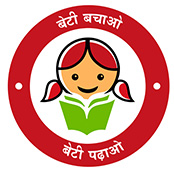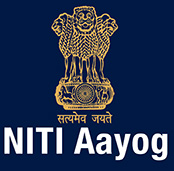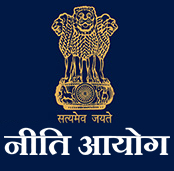- Overview
-
The Infrastructure Connectivity Vertical strives to create a transport system that is common, connected, convenient, congestion-free, clean, and cutting-edge.
- Core Functions
-
-
The Vertical facilitates policy formulation and evaluation with the aim of sustained and holistic development of the transport and logistics sectors.
-
The Vertical is tasked with the appraisal and evaluation of projects, policy research, advocacy, monitoring and evaluation in the following sectors:
-
Roads and Highways
-
Railways
-
Ports and Shipping
-
Inland Waterways
-
Logistics and Goods Transport (including MMLPs, ICDs, CFSs, IL)
-
Airports and Civil Aviation
-
Public Transport (including intercity bus transport, regional rail, etc.)
-
Urban Transport (including metro, light rail/urban railways, BRTS, ropeways, municipal buses, IPT etc.).
-
The units are tasked with the appraisal and evaluation of projects, policy research, advocacy, monitoring and evaluation of these sectors.
-
The Vertical provides policy inputs and suggests interventions in the form of discussions and policy papers to the Line Ministries. It also provides critical inputs to legislative bills.
-
The Vertical appraises SFC/DIB/EFC/PIB/PPR investment projects and scheme proposals as well as Cabinet Notes for consideration of CCEA and other Cabinet committees.
-
The Vertical also provides inputs related to the transport sector for the outcome-based infrastructure review meeting chaired by the Hon’ble Prime Minister. It provides inputs related to outcome-output-based monitoring of the relevant Line Ministries.
-
- Partners
-
- GIZ India
- Indian Port Association
- Central Road Research Institute
- Bureau of Research on Industry and Economic Fundamentals
- International Transport Forum
- Airport Authority of India
- The Energy Research Institute
- Confederation of Indian Industry
- Swiss Re Institute
- School of Planning and Architecture, Bhopal
- CEPT University
- Line Ministries
-
- Ministry of Road Transport and Highways
- Ministry of Railways
- Ministry of Ports, Shipping and Waterways
- Ministry of Civil Aviation
- Ministry of Housing and Urban Affairs
- Department of Logistics (Ministry of Commerce)
- Ministry of Development of North-Eastern Region
- National Highways Authority of India
- National Highways Logistics Management Limited
- Lands Port Authority of India
- Reports
- Projects
-
Key Learnings from Road Sector AppraisalsThe Vertical has prepared and shared a detailed note/report on key learnings with MoRTH and other relevant agencies based on numerous project appraisals undertaken by the Roads and Highways Section in the previous financial year. The note emphasises the learnings and recommendations related to normative costs of road projects, outside-in approach of widening of roads, leading to extra-wide medians, and compliances related to NHAI circulars. The note also provides inputs on improving project due diligence related to traffic forecasting, economic and financial feasibility, land value sharing, value capture financing mechanisms, and project packaging. MoRTH has undertaken many reforms to incorporate the learnings of NITI Aayog. MoRTH has also sanctioned numerous studies to explore some of the more complex learnings for further adaptation.
Key Observations and Learnings Impact Annually revise normative costs + improve calculation method
Revised (State + Geography + Component Selection) – Excel utility
Revisit road widening approaches
Being evaluated - (possible savings of Rs 15k -30k Cr)
Mandatory GIS-based modelling for disasters
Implementation initiated in North-Eastern Projects
Use of Technology – Material Recycling
Provisions in contract initiated, clear guidelines yet to be explored
Use of Technology – Use of RS, NSV, Drones etc.
Network Survey Vehicles and Drone now ensured in all new project studies
Mandatory Road Safety Audit (DPR)
Decision pending
Integration to Bhuvan - GIS-based decision support system
Projects are already geo-tagged, partial linkage to common decision support system
Improve Traffic Forecasting
Revisions of select projects being done, overall guidelines yet to be revised
Explore larger project packaging
Clubbing of packages initiated
Explore VCF
NHAI draft policy for VCF (support from NITI Aayog)
Mandatory use of NHAI Toll data to understand regional trends
Initiated
Improving Efficiency and Reducing Costs of Logistics: The Vertical believes that improving efficiency and reducing costs in the logistics sector is fundamental to boosting economic growth, improving exports, generating employment, and ensuring environmental sustainability.
-
In line with the target of improving efficiency and reducing logistics costs from 14% of the GDP, the Vertical is enhancing the MoCI initiatives by exploring and developing an overarching framework for the logistics sector. This will aim at creating a convergence of data, information, research, good practices, etc.
-
The framework explores four key cost components in goods logistics movement. The first mile, the line/long haul, the last mile, and the nodes that connect the other three components. The first and last-mile logistics (essentially producer and consumer end logistics) are being further explored in terms of requirements of agriculture, mining, industry and urban logistics.
-
The proposed framework intends to bring together innovation, technology, management, and learnings from academia and international experience. For this purpose:
(i) The Vertical and GIZ GmbH cooperated towards collaborative learning under the latter’s ongoing Sustainable and Environment-Friendly Industrial Production-II project. NITI Aayog officials and German experts exchanged information and technical inputs on a number of relevant topics.
(ii) A team of postgraduate students from the School of Planning and Architecture, Bhopal, has attempted a study of how the tools of spatial intelligence and convergence of data/information can be leveraged to improve the logistics supply chain of agri-produce for the Indore region. The study explores the status of agri-production and procurement/sourcing/pooling, identifies producers’ market linkages and available platforms, assesses the infrastructure status (warehousing/cold storage, food processing plants, etc.) and suggests measures for improving logistics management. The study was supported by NITI Aayog.
Design Support System
-
The Vertical is facilitating a GIS-based digital environment by developing an overarching framework to ensure convergence/minimal repetition of work related to the transport infrastructure and logistics sectors.
-
A draft framework for setting up a decision support system is being prepared. This will enable better and more accurate investment decisions and thereby ensure the smoother execution of infrastructure projects.
Goods and People Movement Pattern: The Vertical has taken a structured approach towards exploring the many sporadic studies and sources of information existing in the domain. The idea is to create an automated framework and GIS-based system that converges necessary multi-sectoral information (related to goods and people movements trends and forecasts). This will create a database that can be regularly and automatically updated, easily accessed through the DSS, and directly lead to improvements in logistics efficiency and reduce costs.
Upcoming Projects
-
Promote faster adoption of land value capture mechanisms
-
Creation of a knowledge bank (compendium) on VCF with Indian and international experiences that can be utilised by the Centre, States and local governments
-
Generating awareness with States and ULBs on VCF mechanisms through webinars, conferences and brochures, etc.
-
Developing capacity building strategies and programmes
-
Developing an interactive and illustrative guidebook with variable didactics for different target groups (academicians and senior officials)
-
Derisking Infrastructure in India Infrastructure resilience is vital for achieving India’s economic and social aspirations. The Vertical and Swiss Re Institute are collaborating on a research endeavour to study India-specific projects and climate risks in the transport sector. The focus of this study is to identify emerging risks and provide recommendations for their management and mitigation.
-
Logistics Parks: Reducing Costs and Improving Efficiency of Logistics The Vertical is undertaking documentation of global logistics networks and others to provide key takeaways to the National Highways Logistics Management Limited and improve implementation strategies.
-
Improving Operating Ratio of Indian Railways
-
Privatisation of Goods Terminals
-
Streamlining Project Delivery Systems in Railways
-
- Who’s Who
-
Name Designation Email Sh. Rajeev Singh Thakur Adviser thakurrs[at]ias[dot]nic[dot]in Sh. M. Vijay Kumar Joint Adviser mvijaya[at]gov[dot]in Lt Col. P. Balu OSD pbphanikar[dot]852a[at]gov[dot]in Sh. Ankit Madan CG-II ankit[dot]madan[at]niti[dot]gov[dot]in Sh. Pushpank Tripathi CG-I pushpank[dot]tripathi[at]gov[dot]in Ms. Monika Goyal CG-I goyal[dot]monika[at]niti[dot]gov[dot]in
Infrastructure Connectivity
 National Portal Of India
National Portal Of India 



